General terms of assembly/commissioning and acceptance as well as terms for training and on-the-job-briefing
of Masa GmbHVersion: 20.01.2020
§ 1 Scope and prices
1.1 These „General terms of assembly, commissioning and acceptance, as well as the terms for training and on-the-job briefing“ (hereinafter referred to as: "Terms of Assembly") of Masa GmbH (hereinafter referred to as: “Masa”) shall apply to the installation, assembly, and commissioning of Masa plants, machines, and components as well as to retrofitting measures and to the training and on-the-job briefing of personnel between Masa and the client (hereinafter referred to as: “client”, together they are called “contracting parties") in the version in force on the date the contract is concluded.
1.2 The contracting parties shall agree that the "Commercial Terms" of Masa become a supplementary part of the respective contract, unless specified otherwise in these assembly conditions.
1.3 Unless a lump-sum price has specifically been agreed on for the activities specified in section 1.1, the services rendered by Masa shall be charged individually by time needed according to the specified rates.
§ 2 Assembly
2.1. Assembly
During the assembly process, all plant components delivered by Masa that are essential for commissioning shall be installed and the individual components shall be checked by Masa personnel for their operational readiness.
2.1.1 Time needed for assembly, assembly delays
a) All details regarding the time needed for assembly shall be considered reference values. In case the assembly time has been bindingly agreed in writing, it shall be considered met if by its expiration the installation is ready for acceptance by the client according to section 5, or, in case a trial run has been contractually scheduled, is ready for the trial run to be carried out.
b) In case the assembly is delayed due to measures in the context of labour disputes, including, but not limited to strike and lockout, as well as to the occurrence of circumstances that are beyond the control of Masa, an appropriate extension of the assembly time shall commence. Apart from this, we refer to the regulation for journeys home according to 2.1.1 d and to section 4of the "Commercial Terms" issued by Masa.
c) In case waiting periods occur that are caused by the client, the client shall be obligated to pay Masa the resulting costs including repeat travel costs as restitution. The same shall apply in case of agreeing on a lump-sum price.
d) Regulation for journeys home:
All Masa assembly personnel shall have the right to fly/travel home
- less than 500 km - one travel home every 2 weeks of assembly time;
- more than 500 km to 799 km - one journey home every 3 weeks of assembly time;
- more than 800 km - one journey home every 4 weeks of assembly time.
Usually, the agreed number of assembly personnel shall not change due to a corresponding change in personnel. However, the client shall have to take into consideration the fact of the change in personnel (e.g. during planning for hotel rebooking).
2.1.2 Project managers
The project managers or their deputies (on the part of Masa the responsible chief assembler or his deputy) must be adequately available at the specified location during the assembly and the commissioning preparations. Deputies must fulfil the same requirements and have the same authority as the project managers.
2.1.3 Assembly process
Masa shall specify a schedule with an approximate timetable in cooperation with the client. Unless otherwise agreed in writing, this schedule shall not be binding regarding the indicated assembly time.
2.2 Plant operator
The client shall disclose to Masa the name of the responsible plant operator as well as of his staff (future operating personnel) prior to assembly begin.
2.3 Client’s responsibilities
The client’s operating personnel is to assist during the assembly phase in order to become familiar with the plant. The client shall support the assembly personnel of Masa during the smooth execution of the assembly at his own expense. The following list contains the essential points which must be observed as prerequisite for faultless and continuous assembly and commissioning.
2.3.1 Check lists
Prior to starting the assembly process as well as the trial-run and commissioning phases, Masa shall send out the following check lists, which the client has to fill in and send back:
(a) Check list prior to assembly begin: This list documents – supported by digital photos – that all requirements for the start of the assembly have been met;
(b) Check list prior to starting the trial run and the commissioning phase: This list documents that all requirements for the trial run and the commissioning phase have been met;
2.3.2 The following services are to be carried out continuously or supplied by the client until the delivery has arrived or respectively until assembly begins or other services by Masa are carried out:
(a) Carrying out of all structural analyses, preparation and execution of all required construction work (according to the recommendations of the enclosed foundation plans), as well as meeting of waiting periods required, e.g. for concrete curing;
(b) Provision of a passable access road to the assembly site for unloading and transporting the machinery and the components;
(c) Provision of suitable and protected interim storage areas for protecting the components from weather impact;
(d) Conclusion of an insurance for the delivered components;
(e) Provision of cranes and other lifting tools (with personnel), lifting and/or working platforms (with personnel); the exact requirement as well as the specification and the period of usage shall be coordinated with Masa;
(f) Transfer of the Masa assembly personnel from/to the airport and daily transfer from the hotel to the construction site and back (possibly hired car);
(g) Provision of air tickets for the Masa assembly personnel (non-stop flights as a standard, multi stop flights only in case of no non-stop flights are available);
(h) Provision of accommodations for the Masa assembly personnel (middle-class hotel or flat as per European standards);
(i) Provision of a dry and lockable room for storing the tools of the Masa assembly personnel or provision of a space for the 40’ tool container;
(j) Provision of theft-proof recreation and working rooms with heating, lighting, washing and sanitary facilities etc. for the Masa assembly personnel;
(k) Provision of auxiliary staff for transport and assembly in the required number and with the required qualifications:
- Production facility – at least:
one (1) auxiliary worker with knowledge in the field of electricity and electrical systems as well as
one (1) auxiliary worker with knowledge in the field of mechanics and
two (2) auxiliary workers, unskilled, however, at least one (1) person with welding skills as well as fork-lift skills.
Depending on the plant layout, the number of required auxiliary workers may vary and shall be determined by the Masa project manager or service manager. - For the installation of a rack plant:
approx. three (3) to four (4) auxiliary workers, fork lifts and fork-lift drivers; provision of production pallets as assembly aids.
The auxiliary workers are to follow the instructions of the Masa assembly personnel. Masa shall not assume any liability/responsibility for the auxiliary staff. Further auxiliary workers are required for the assembly of additional components not listed, such as sound-proof cabins.
(l) Installation of the necessary accident prevention measures for protection against accidents caused by the construction work on-site;
(m) Instruction of the Masa assembly personnel regarding existing local safety regulations; Report of any violations on the part of the Masa assembly personnel of such safety regulations;
Provision of electricity, water and sufficient lighting, as well as terminal boxes as per the specifications in the foundation drawings and services as per the specifications in the tables of services.
Note: The interface for the delivery scope both for Masa components and for service performances is defined as the respective switch cabinet.Transformers, distribution boxes, and connected power leads are to be supplied in the corresponding dimensions and with the corresponding safety fuses by the client.
All power cables to the individual components shall lead through cable ducts. Cable installations deviating from this (e.g. via cable racks) are available at an extra charge.
(n) Provision of all plant components/services not included in the Masa delivery scope (third-party products/services);
Note: Technical data, capacities, interfaces for the controls and any other services for the third-party products are to be clarified in detail prior to assembly start.Schedules for delivery and assembly of third-party products and services are to be coordinated with the site manager and/or the Masa project manager.
(o) Upon request, the client may be asked to provide missing tools to the Masa assembly personnel (such as power tools in case a voltage of 230 V is not available);
(p) Provision of continuous waste disposal;
(q) In general, Masa assembly personnel is capable of communicating both in German and in English. For other languages, the client is to provide an interpreter with technical understanding.
If the building services required on the client's site cause any delays or impede the assembly, refer to the regulations in section 2.1.1 b and c as well as in section 5.3.
2.3.3 To be provided by the client free of charge until the test-run/commissioning phases start:
(a) Provision of compressed air;
(b) Provision of hydraulic oil and gear oil;
(c) Provision of a separate telephone line for modem operation for remote maintenance and/or a high-speed internet connection, transmission rate ≥ 500 Kbit;
(d) Provision of fork lifts for commissioning the plant, e.g. for transporting block packages, for exchanging moulds, etc.;
(e) Provision of raw materials, bonding material, cement, additives, colours, etc. in sufficient quantities and quality. The quality of the materials must be determined prior to the trial run and commissioning through examinations (e.g. grading curve);
(f) Provision of moulds according to the technical specifications on the part of Masa (if part of the process);
(g) Provision of production pallets in sufficient quantity and quality regarding planeness, load capacity, thickness, etc. (if part of the process);
(h) Provision of transport pallets in sufficient quantity (if part of the process);
(i) Provision of necessary accident-prevention equipment both for the construction site and for third-party products.
(j) Provision of the safe signal transfer for the control of the safety devices of plant components for the Masa plant provided by the client.
2.4 Miscellaneous
a) All complaints are to be indicated to Masa without delay.
b) The Masa assembly personnel shall be obligated to create both a daily report as well as a listing of all working hours. The client is to confirm the hours worked by the Masa assembly personnel weekly with his signature.
§ 3 Commissioning and trial run
Commissioning and/or trial run shall take place in two parts:
3.1 Without material
The pure functionality of the individual components and/or of the processes is tested without material.
3.2 With material
Commissioning and/or trial run take place by testing the production process with two (2) standard moulds. During this phase, sufficient operating personnel for the individual plant components must be constantly present. If additional moulds are to be tested, the resulting costs shall be at the expense of the client, especially if a lump-sum price has been agreed.
§ 4 Training and on-the-job-briefing
4.1 Unless otherwise agreed in writing, training and on-the-job briefing of the operating personnel shall take place during commissioning and/or during the trial run. Training and on-the-job briefing are to be carried out without interruptions.
4.2 The scope of services shall essentially include all points which ensure
- continuous operation
- the setup of the delivered components and the elimination of faults
- the corresponding safety instructions.
This typically does not include the on-the-job briefing and training for client components or components provided by a third party, nor for complete units that are included in the Masa delivery scope but are not considered typical Masa components, such as strapping units.
4.3 Scope of services
- For all Masa machines: Operation, setup, maintenance
- Moulds for block-making machines and presses: Mould exchange, maintenance and/or repair methods
- Controls: Operation, setup, processing and elimination of fault messages
- Complete plant: Operation
§ 5 Acceptance
5.1 For Masa machines and/or complete Masa plants:
a) Acceptance shall take place immediately after commissioning with standard products, unless agreed otherwise. As soon as the output quoted has been provided in a one-shift trial run, acceptance shall also be completed. An acceptance protocol shall be created and signed by both contracting parties.
b) If acceptance and/or the creation of the acceptance protocol is not possible within thirty (30) days after commissioning for reasons that are beyond the control of Masa, the plant shall be considered accepted.
5.2 For individual components and/or retrofits:
Acceptance shall take place immediately after the installation with commissioning of the individual components and/or of the retrofit without separate written confirmation.
5.3 If the commissioning or other services are delayed for reasons that are beyond the control of Masa GmbH – especially in cases as per section 4.6 ("Force Majeure") and sections 2.3, 2.4 ("Change to the scope of supplies and services") of the "Commercial Terms" of Masa GmbH, the commissioning or service will be postponed in a reasonable way. Reasonable is at least the time period by which the completion of the plant or the fulfilment of the performance has been delayed by the occurrence.
5.4 Masa GmbH may also hand over the plant before the date of the contractual commissioning.
5.5 If it has been proved during the commissioning that the plant has the agreed characteristics, the plant shall be considered as accepted. The client owes Masa GmbH the immediate creation of the written acceptance protocol.
5.6 Remaining works or deficiencies that are not essential for the operation of the plant shall not stand in the way of acceptance. They shall be included in a list attached to the acceptance protocol. The client allows Masa GmbH to eliminate these insignificant remaining works or deficiencies in a timely manner.
5.7 If the client uses the plant, this shall be considered as acceptance.
§ 6 Miscellaneous
6.1 All assembly tools and equipment supplied by Masa for the assembly shall remain the absolute property of Masa.
6.2 Usually, Masa shall provide the necessary tool containers as well as the storage goods supplementing the assembly material (detailed list in the container). Unless agreed otherwise, the tool container and surplus storage goods (such as cables and other assembly material) shall remain the property of Masa GmbH. No right of retention shall exist on the part of the client on any account.
6.3 In case waiting periods occur during assembly, commissioning, training, and trial-run phase or acceptance that are caused by the client, the resulting costs including travel costs shall be at the expense of the client. The same shall apply in case of agreeing on a lump-sum price.
6.4 Masa is an international enterprise and employs qualified specialists from various nations. Therefore, a client is not entitled to require from Masa that they assign only German workforce, e.g. for installation works.

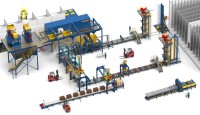 It's a long way from raw materials through the mixture to the finished stone. Many plant components are involved in this process. Only if the system components are matched, can one be assured of a smooth process and economical operation of the block and paver making plant.
It's a long way from raw materials through the mixture to the finished stone. Many plant components are involved in this process. Only if the system components are matched, can one be assured of a smooth process and economical operation of the block and paver making plant.
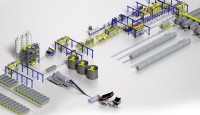 The manufacturing of autoclaved aerated concrete products demands high standards for mixing and dosing of the aggregates, the control of the fermentation process and the control of each production step. Masa's aerated concrete installations are proven advanced technology processes, designed according to customers specific requirements. This approach allows complete solutions to ensure highly efficient, optimised processes resulting in consistent final product quality.
The manufacturing of autoclaved aerated concrete products demands high standards for mixing and dosing of the aggregates, the control of the fermentation process and the control of each production step. Masa's aerated concrete installations are proven advanced technology processes, designed according to customers specific requirements. This approach allows complete solutions to ensure highly efficient, optimised processes resulting in consistent final product quality.
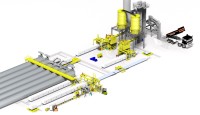 It's a long way from raw materials through the mixture to the finished sand lime bricks. Many plant components are involved in this process. Only if the system components are matched, can one be assured of a smooth process and economical operation of the sand lime brick production plant.
It's a long way from raw materials through the mixture to the finished sand lime bricks. Many plant components are involved in this process. Only if the system components are matched, can one be assured of a smooth process and economical operation of the sand lime brick production plant.
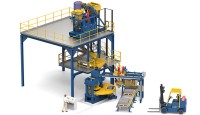 It's a long way from raw materials over mixture to the finished (Kerb)stone. Masa Kerbstone presses were developed to fulfill among other criteria, the special requirements of the "British Standard" kerbstones. This "British Standard" is still a condition in countries of the Middle East and the UK.
It's a long way from raw materials over mixture to the finished (Kerb)stone. Masa Kerbstone presses were developed to fulfill among other criteria, the special requirements of the "British Standard" kerbstones. This "British Standard" is still a condition in countries of the Middle East and the UK.
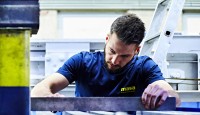 Masa plants and machines are installed and commissioned by our own experienced fitters. Masa relies on qualified personnel, trained in Germany.
Masa plants and machines are installed and commissioned by our own experienced fitters. Masa relies on qualified personnel, trained in Germany.
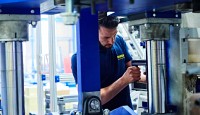 The Masa Lifetime service extends far beyond the actual assembly and commissioning of a plant. Masa can rely on specific know-how and an industry experience of more than 110 years.
The Masa Lifetime service extends far beyond the actual assembly and commissioning of a plant. Masa can rely on specific know-how and an industry experience of more than 110 years.
 Do you need support with your machine? Masa Support scores in both quality and significantly improved accessibility. Whether "first aid" for technical problems, updates, functional expansions of your production plant or technical questions, the know-how provided by Masa Support covers a wide range of services.
Do you need support with your machine? Masa Support scores in both quality and significantly improved accessibility. Whether "first aid" for technical problems, updates, functional expansions of your production plant or technical questions, the know-how provided by Masa Support covers a wide range of services.
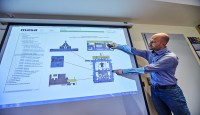 One of the keys to increasing productivity and quality is continuous training of the machine and maintenance personnel.
One of the keys to increasing productivity and quality is continuous training of the machine and maintenance personnel.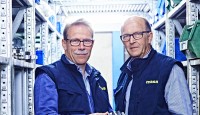 Are you looking for your contact? The Masa Service team introduces itself.
Are you looking for your contact? The Masa Service team introduces itself.
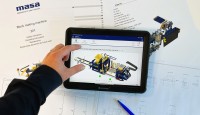 The Masa Service Cloud is the latest product in the family of digital products.
The Masa Service Cloud is the latest product in the family of digital products.